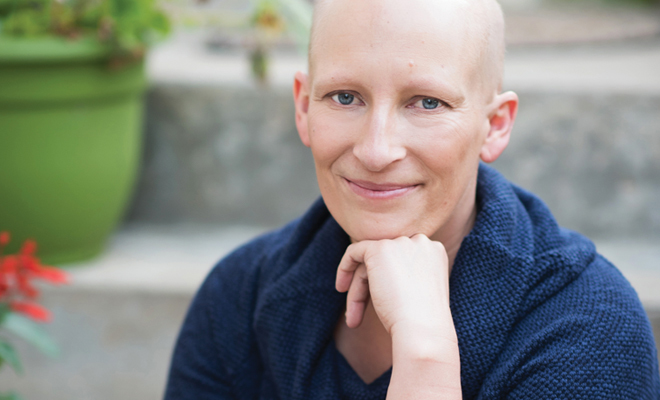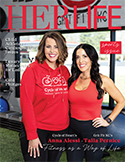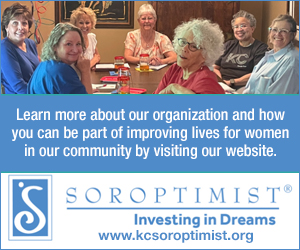 Devine Studios
Devine Studios
Jill Ramsdell: “Stay positive and keep on keeping on.”
14. An age when many little girls become young ladies. Overnight, it seems that the child who loved Barbie is now giggling with her friends about something silly in school or drawing curlicues around the name of a study hall crush. Parents fret about the changes coming over their daughter, some longing for those simpler days of sugar and spice and everything nice. A kiss on the cheek. A sweet hug goodnight.
14. Jill Ramsdell’s daughter was about to hear a very tough message. It would strip away her innocence and thrust her into a world of the cruel unknown. Jill knew all too well what these four words would convey to her child; at the same age, so many years ago, Jill heard the same chilling sentence from her mother. “I have breast cancer.”
Any daughter, or son, at any age would be shocked with the words that her mother was fighting a very serious health battle. But it’s especially frightening to a child, threatening an outcome that could turn a fragile world upside down.
Unfortunately, it’s a sentence many children will hear. About one of every eight women will be diagnosed with breast cancer sometime in their lives. It’s a battle that also claims the lives of nearly 41,000 women each year.
“My oldest daughter was just in eighth grade, the same grade I was in when my mom was diagnosed. My mom’s breast cancer was detected in 1988. She had a mastectomy, chemo and radiation. Her cancer went into remission for five years,” recalled the 42-year-old resident of Gardner, Kansas. “But a yearly scan found a tumor in her liver. Again chemo, radiation and a bone marrow transplant. Unfortunately, she passed away in 1994 when I was 19 years old. The following year it was discovered my dad had soft tissue sarcoma. He went through chemo, radiation and surgery, but he survived.”
Given Jill’s family history with cancer, she had come to accept that it wasn’t a matter of if she got cancer, it was when. Yet when the disease reared its head in her life, Jill denied its presence. “When I found a lump in 2013, I ignored it for a while. I didn’t have health insurance, and I felt overwhelmed,” she commented. “My dad and sister are in California, but they did everything they could to help me. My sister found an organization to check it out and get me a mammogram. After that first mammogram, the doctors suspected that something was going on. Then it was appointments galore after that.”
Jill’s breast cancer is in Stage IV. According to the National Breast Cancer Foundation, “Stage IV describes invasive breast cancer that has spread beyond the breast and nearby lymph nodes to other organs of the body, such as the lungs, distant lymph nodes, skin, bones, liver or brain. You may hear the words ‘advanced’ and ‘metastatic’ used to describe Stage IV breast cancer.”
“Being in Stage IV breast cancer means that there’s always something going on. I’ve had a double mastectomy, ten lymph nodes removed and my ovaries removed. I’ve also had a port inserted as an outpatient surgery to deliver my treatments,” Jill shared. “They’ve also found nodules in my lungs and spots on my liver. I will never be cured of cancer, but it’s like having diabetes; you manage it for the rest of your life. My doctor has a plan for the rest of my treatments. According to the doctor, we have lots of options to try.”
Arimidex, Taxol, even a drug referred to as The Red Devil because of its frightening side effects have been a part of the treatment strategy as Jill dealt with a litany of medications to combat her cancer. Given that her journey to put the brakes on this disease has been many years in the making, Jill has a solid schedule in place to endure her devilish chemo drug.
“Most weeks, I’ll work until 11:30 on Friday morning, and then I’ll have a chemo treatment in the afternoon at the University of Kansas Cancer Center in Overland Park,” she noted. “Then I’ll rest for the remainder of the weekend at home and go back to work on Monday. The Red Devil can get people very sick, but I’ve been pretty lucky in that aspect, although I have lost my hair.”
While drugs and medications are a key in her battle against cancer, Jill attributes her positive attitude as a significant part of her treatment strategy. She strives to make the most of whatever it is she’s doing and does not dwell on the negative. Her positivity helps ensure that her children are coping with her cancer: Juliet, 18; Logan, 15; Malory, 12; and Tyson, 9. “Because I’m positive, they are positive. They do like to have some information to share with friends and their parents. But I don’t get into real details because they really don’t want to talk about it. In fact, my 18-year-old has been with me to get chemo, which gives her a better idea of what is going on, and she especially doesn’t want to talk about it,” Jill commented, “Then again, they all have such different personalities. When I told my 15-year-old about my diagnosis, she said, ‘How are we going to pay for this?’”
While her children’s support offers much to Jill, she finds the care and attention she receives from the rest of her family and friends are critical. “My mother and father-in-law have been with me to every single appointment. They are an incredible part of my support group in town, along with my two best friends,” she added. “My co-workers help too, and my church is right behind my house. My brother lives in Overland Park, and he helps out whenever he can. My father and sister live in California, but they do whatever they can for me. I talk to my sister every day on the phone.”
Jill’s job also gives her strength and enjoyment. For the last seven years, she’s served as a paraeducator at the Moonlight Elementary School in the Gardner Edgerton School District, in Gardner, Kansas. She functions as support staff for teachers and small groups of students that require help in math or have special needs.
After four years of dealing with her cancer, Jill has learned much about herself and how to overcome obstacles. Yet she realizes that no matter how strong you view yourself as a person, cancer teaches you many life lessons, especially when it comes to asking for help. “The hardest part for me was being overwhelmed with all of the different appointments I needed to make, having to miss work to get to them and worrying about the kids,” she shared. “I wish I would have known then that I could have asked for more help. Now, I reach out usually to my best friends in my cul-de-sac, my in-laws and co-workers. Of course, I get moral support from my father and sister.”
While many of us desire to do the right thing for those in need, offering assistance is one thing and then pitching in and actually doing it is another. Jill said that many people offered, but it was difficult to know exactly what help she needed at the time of the proposal. “I’d say to just do it. Don’t wait to be asked. Sometimes friends would just show up and get the kids fed or throw in a load of laundry. Some would take the dog and play with him. Others took the kids for the weekend so I could recover in a quiet house. A lot of people brought food on Friday nights, and then I knew that I could go straight to bed to recover from the chemo but the kids would be fed.”
In addition, Jill shares this advice for women about breast cancer and its prevention. “Do your self-checks and don’t ignore the signs. Don’t be scared if you’re concerned you have cancer. They’ve come so far in the treatments, and there are ways you don’t lose your hair and don’t get sick. They’re constantly coming up with new treatments. But most importantly, don’t hesitate. There are so many resources, and you’ll find the right one for you.”
According to the American Cancer Society, “Any of the following unusual changes in the breast can be a symptom of breast cancer: swelling of all or part of the breast; skin irritation or dimpling; breast pain; nipple pain or the nipple turning inward; redness, scaliness or thickening of the nipple or breast skin; a nipple discharge other than breast milk; and a lump in the underarm area. These changes also can be signs of less serious conditions that are not cancerous, such as an infection or a cyst. It’s important to get any breast changes checked out promptly by a doctor.”
For Jill, every day is a blessing, one to be shared with family and friends. Her positive outlook is infectious and serves as a reminder how fortunate we are when we have good health. “I can’t stress enough the importance of monthly breast self-exams,” she remarked. “And if you do find something, don’t get overwhelmed, even if you have a cancer diagnosis. Stay positive and keep on keeping on.” ■









